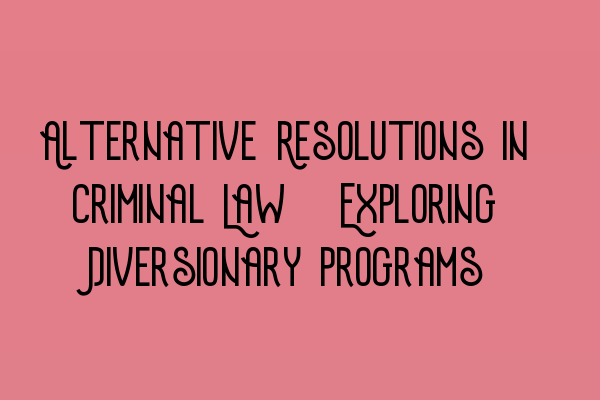Alternative Resolutions in Criminal Law: Exploring Diversionary Programs
When it comes to criminal law, traditional punitive measures are not always the most effective or appropriate solution for every case. In recent years, the legal system has recognized the value of alternative resolutions as a means to address certain offenses and rehabilitate offenders.
Diversionary programs have gained traction and become a prominent part of criminal justice systems worldwide. These programs offer a range of options that aim to divert individuals away from the traditional court process and towards alternative pathways.
The Benefits of Diversionary Programs
Diversion programs provide several advantages for both the offender and society as a whole. By offering an alternative resolution, these programs can:
- Reduce the burden on the court system
- Promote rehabilitation and reduce recidivism rates
- Address the underlying causes of offending behavior
- Provide opportunities for education, therapy, or community service
By addressing the root causes of criminal behavior and providing support, diversionary programs have the potential to break the cycle of crime and create a positive impact on both individuals and communities.
Types of Diversionary Programs
Diversionary programs come in various forms, each catering to different offenses and individuals. Here are some examples:
- SQE 1 Practice Exam Questions – These programs are aimed at first-time offenders or those with minor offenses. They often involve community service, counseling, or educational programs to help individuals understand the consequences of their actions.
- SQE 1 Practice Mocks FLK1 FLK2 – Drug and alcohol diversion programs specifically target individuals struggling with substance abuse issues. These programs offer treatment, counseling, and support services to address addiction and reduce the likelihood of reoffending.
- SQE 2 Preparation Courses – Mental health diversion programs focus on individuals with mental health disorders who have committed non-violent offenses. They provide access to treatment, therapy, and support networks to address underlying mental health issues and promote recovery.
- SQE 1 Preparation Courses – Restorative justice programs prioritize the needs of victims and aim to repair harm caused by the offense. Offenders engage in dialogue, make amends, and work towards rehabilitation, allowing all parties involved to heal.
These are just a few examples of diversionary programs, and the specific options available can vary based on jurisdiction and the nature of the offense.
Implementing Diversionary Programs
Diversionary programs require collaboration between various stakeholders, including legal professionals, law enforcement agencies, social services, and community organizations. The successful implementation of these programs necessitates:
- Clearly defined eligibility criteria
- Access to appropriate support services
- Monitoring and evaluation to measure effectiveness
- Continued investment in resources and training
Efforts must also be made to raise awareness among legal professionals, judges, prosecutors, and defense attorneys about the benefits of diversionary programs and the appropriate circumstances in which they can be utilized.
By improving collaboration and investing in these programs, the criminal justice system can enhance its ability to address the diverse needs of offenders and promote positive outcomes.
To stay informed about the latest developments in criminal law and practice, check out our SRA SQE Exam Dates page. We also offer comprehensive SQE 1 Preparation Courses and SQE 2 Preparation Courses to help you excel in your legal career.
Diversionary programs have the potential to transform the criminal justice system, providing more effective and holistic approaches to crime prevention and offender rehabilitation. By investing in these alternative resolutions, we can work towards a safer and more just society for all.
